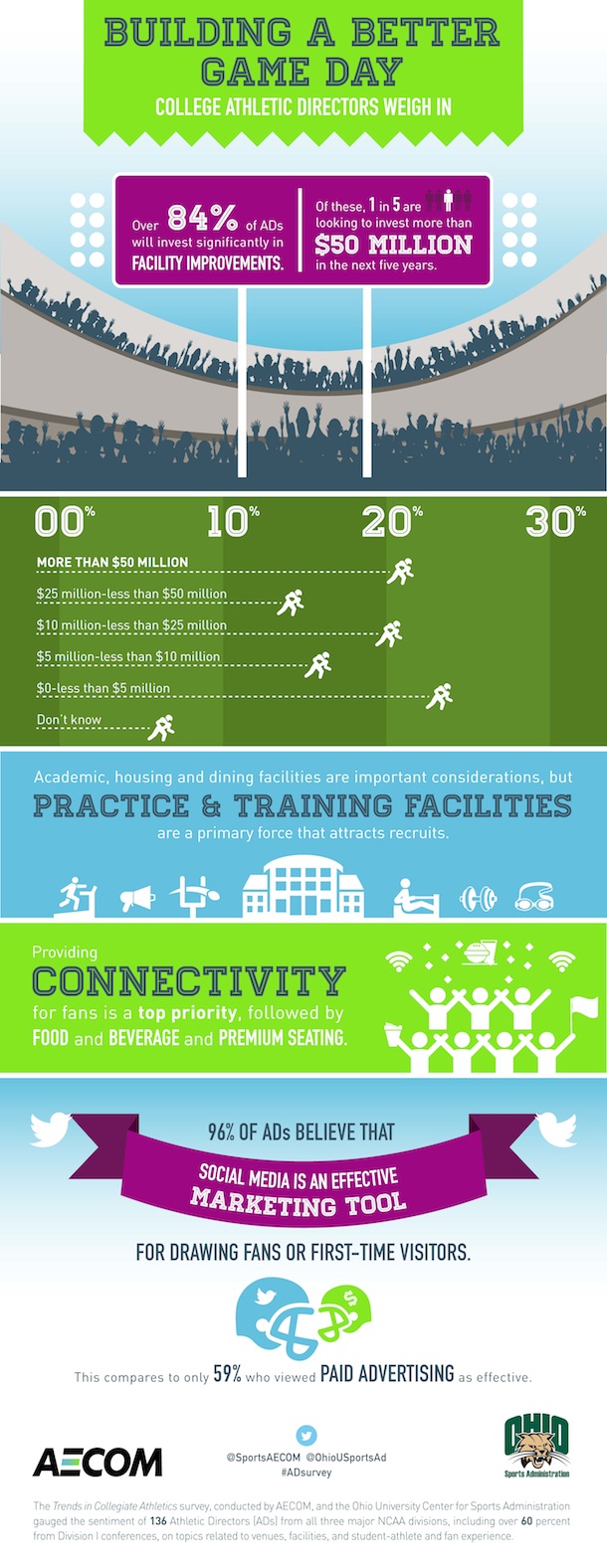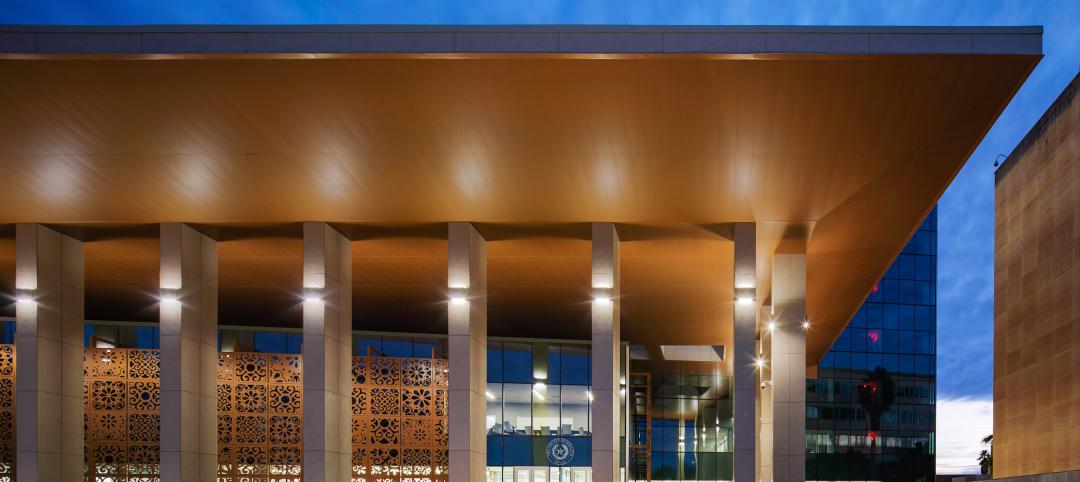According to a survey released today, NCAA athletic directors (ADs) are increasingly focused on enhancing athletic facilities to attract top student athletes and maintain or grow their fan base amidst an extremely competitive environment.
The Trends in Collegiate Athletics survey, conducted by AECOM and Ohio University's Center for Sports Administration, was completed in July-August 2014. The survey gauged the sentiment of 136 ADs from all three major NCAA divisions, including over 60% from Division I conferences, on topics related to venues, facilities, and student-athlete and fan experience.
According to the survey, more than eight in 10 participating ADs plan to make significant investments in facilities over the next five years to target potential recruits and spectators. Of those, one in five plans on spending more than $50 million on renovations and new construction projects. Nearly 95% of ADs are concerned about the funding of their programs.
The majority of participating ADs are investing in upgrades and amenities that they believe will drive game-day attendance and enhance the fan experience, notably connectivity, better food and beverage options, and, particularly at the Division I level, premium seating.
“This survey shows that, as traditional funding streams become less viable, ADs are increasingly focused on fiscal responsibility and making their programs sustainable,” said Jon Niemuth, AECOM Director of Sports, Americas. “One way they are doing this is by investing in upscale amenities, once reserved for the professional level, that will attract fans willing to pay a premium for a unique game day experience.”
“A big issue keeping athletic directors up at night is the funding and performance of their programs,” said Dr. Heather Lawrence-Benedict, Associate Professor of Sports Administration and the AECOM Professor of Sport Business, Ohio University. “ADs are caught in a cyclical pattern—to generate funding they need talented recruits, to attract recruits they need the top facilities, and to build those facilities it goes back to funding. On top of this, they need to appeal to alumni and donors. An unexpected donation, a breakout athlete or a Cinderella season can all be major catalysts for an athletics program.”
To help generate awareness for their upgrades and promote games and game-day activities, the vast majority of ADs (96%) in the study find social media to be an effective marketing tool for drawing fans or first-time visitors to games. That compares to 59% who view paid advertising as effective. Lowering ticket costs was ranked as the least effective option to draw fans by one-third of participating ADs.
ADs are also focused on facility upgrades that will enhance the student athlete experience, and ADs overwhelmingly agree that practice and training facilities are a primary force that attracts recruits, while academic, housing and dining facilities are also rapidly becoming important. If funding was not a factor, ADs would invest heavily in practice and training facilities and locker rooms to appeal to potential recruits.
AECOM and Ohio University’s Center for Sports Administration developed the Trends in Collegiate Athletics through a collaborative effort as part of their ongoing strategic partnership, which began in 2007. The joint effort, which was extended for the third time in 2013, is aimed at educating the next generation of sports business leaders.
To view the full results of the survey, click here.
Related Stories
Giants 400 | Nov 14, 2023
Top 90 Justice Facility Architecture Firms for 2023
DLR Group, Stantec, HDR, HOK, and Elevatus Architecture top BD+C's ranking of the nation's largest justice facility architecture and architecture engineering (AE) firms for 2023, as reported in the 2023 Giants 400 Report. Note: This ranking includes revenue from all public safety/justice facilities buildings work, including correctional facilities, fire stations, jails, police stations, and prisons.
Giants 400 | Nov 13, 2023
Top 65 Airport Facility Architecture Firms for 2023
Gensler, Corgan, PGAL, and HOK top BD+C's ranking of the nation's largest airport terminal and airport facilities architecture and architecture engineering (AE) firms for 2023, as reported in the 2023 Giants 400 Report.
Data Centers | Nov 13, 2023
Data center sector trends for 2023-2024
Demand for more data centers is soaring, but delivery can be stymied by supply delays, manpower shortages, and NIMBYism.
Education Facilities | Nov 9, 2023
Oakland schools’ central kitchen cooks up lessons along with 30,000 meals daily
CAW Architects recently completed a facility for the Oakland, Calif., school district that feeds students and teaches them how to grow, harvest, and cook produce grown onsite. The production kitchen at the Unified School District Central Kitchen, Instructional Farm, and Education Center, (“The Center”) prepares and distributes about 30,000 meals a day for district schools lacking their own kitchens.
Laboratories | Nov 8, 2023
Boston’s FORUM building to support cutting-edge life sciences research and development
Global real estate companies Lendlease and Ivanhoé Cambridge recently announced the topping-out of FORUM, a nine-story, 350,000-sf life science building in Boston. Located in Boston Landing, a 15-acre mixed-use community, the $545 million project will achieve operational net zero carbon upon completion in 2024.
Retail Centers | Nov 7, 2023
Omnichannel experiences, mixed-use development among top retail design trends for 2023-2024
Retailer survival continues to hinge on retail design trends like blending online and in-person shopping and mixing retail with other building types, such as offices and residential.
Giants 400 | Nov 6, 2023
Top 110 Cultural Facility Architecture Firms for 2023
Populous, Gensler, HGA, DLR Group, and Quinn Evans top BD+C's ranking of the nation's largest cultural facilities sector architecture and architecture engineering (AE) firms for 2023, as reported in the 2023 Giants 400 Report. Note: This ranking includes revenue from all cultural building sectors, including concert venues, art galleries, museums, performing arts centers, and public libraries.
Giants 400 | Nov 6, 2023
Top 170 Government Building Architecture Firms for 2023
Page Southerland Page, Gensler, Stantec, HOK, and Skidmore, Owings & Merrill top BD+C's ranking of the nation's largest government building sector architecture and architecture engineering (AE) firms for 2023, as reported in the 2023 Giants 400 Report. Note: This ranking includes revenue from all government building sectors, including federal, state, local, military, and Veterans Affairs (VA) buildings.
Designers | Nov 6, 2023
DLR Group opens office in Nashville, Tenn.
DLR Group is expanding its presence in the Southeast with the opening of an office in downtown Nashville, Tenn.—a collaborative effort led by DLR Group Principals Matthew Gulsvig, AIA, LEED AP, and Randall Coy.
Healthcare Facilities | Nov 3, 2023
The University of Chicago Medicine is building its city’s first freestanding cancer center with inpatient and outpatient services
The University of Chicago Medicine (UChicago Medicine) is building Chicago’s first freestanding cancer center with inpatient and outpatient services. Aiming to bridge longstanding health disparities on Chicago’s South Side, the $815 million project will consolidate care and about 200 team members currently spread across at least five buildings. The new facility, which broke ground in September, is expected to open to patients in spring 2027.

























